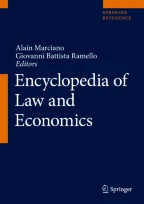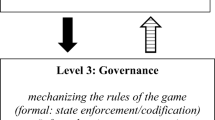Development and Property Rights

This chapter argues that economic development originates not from the gains from trade and specialization under a division of labor but fundamentally from an institutional framework of property rights which permits the gains from trade and innovation that emerge on a societal wide scale. It is this framework that enables the transition from small-scale trading and capital accumulation to medium-scale trading and capital accumulation and finally to large-scale trading and capital accumulation. All of humanity was once poor; those societies that have been able to escape from poverty are those that were able to get on this development path by adopting the institutional framework of property, contract, and consent. We argue that well-defined and exchangeable private property rights yield economic growth by operating as a filter on economic behavior – the establishment of property rights embedded in the rule of law weeds out unproductive entrepreneurship and the corresponding politicized redistribution of property rights, with rent-seeking and predation as its consequence, and engenders instead productive entrepreneurship and a more efficient allocation of property rights and with that a realization of the gains from trade and the gains from innovation. The fundamental cause of economic development, we argue, is the institution of private property, as it is this institutional framework that results in productive specialization and peaceful cooperation among diverse and disparate individuals.
This is a preview of subscription content, log in via an institution to check access.
Access this chapter
Subscribe and save
Springer+ Basic
€32.70 /Month
- Get 10 units per month
- Download Article/Chapter or eBook
- 1 Unit = 1 Article or 1 Chapter
- Cancel anytime
Buy Now
Price includes VAT (France)
eBook EUR 802.49 Price includes VAT (France)
Hardcover Book EUR 1,002.24 Price includes VAT (France)
Tax calculation will be finalised at checkout
Purchases are for personal use only
Similar content being viewed by others

Development and Property Rights
Chapter © 2014

Property rights, entrepreneurship, and economic development
Article 02 December 2019

Intellectual Property Rights and Development: A Contingent Political Relationship
Chapter © 2016
References
- Alchian AA (1961[2006]) Some economics of property. In: Property rights and economic behavior. The collected works of Armen A. Alchian, vol 2. Liberty Fund, Indianapolis Google Scholar
- Alchian AA (1965[2006]) Some economics of property rights. In: Property rights and economic behavior. The collected works of Armen A.Alchian, vol 2. Liberty Fund, Indianapolis Google Scholar
- Bauer P (2000) From subsistence to exchange and other essays. Princeton University Press, Princeton BookGoogle Scholar
- Baumol WJ (1990) Entrepreneurship: productive, unproductive, and destructive. J Polit Econ 98(5):893–921 ArticleGoogle Scholar
- Boettke PJ (1994[2001]) The political infrastructure of economic development. In: Calculation and coordination: essays on socialism and transitional political economy. Routledge, New York Google Scholar
- Boettke PJ, Coyne C (2003) Entrepreneurship and development: cause or consequence? Adv Austrian Econ 6:67–87 ArticleGoogle Scholar
- Buchanan JM (1968[1999]) The demand and supply of public goods. The collected works of James M. Buchanan, vol 5. Liberty Fund, Indianapolis Google Scholar
- Demsetz H (1967) Toward a theory of property rights. Am Econ Rev 57(2):347–359 Google Scholar
- Easterly W (2009) Can the West save Africa? J Econ Lit 47(2):373–447 ArticleGoogle Scholar
- Hayek FA (1945) The use of knowledge in society. Am Econ Rev 35(4):519–530 Google Scholar
- Holcombe RG (1998) Entrepreneurship and economic growth. Q J Austrian Econ 1(2):45–62 ArticleGoogle Scholar
- Kirzner IM (1973) Competition & entrepreneurship. University of Chicago Press, Chicago Google Scholar
- Kirzner IM (1988) Some ethical implications for capitalism of the socialist calculation debate. Soc Philos Policy 6(1):165–182 ArticleGoogle Scholar
- McCloskey DN (2010) Bourgeois dignity: why economics can’t explain the modern world. University of Chicago Press, Chicago BookGoogle Scholar
- Mises L (1920[1975]) Economic calculation in the socialist commonwealth. In: Hayek FA (ed) Collectivist economic planning. August M. Kelley, Clifton Google Scholar
- Mises L (1922[2008]) Socialism: an economic and sociological analysis. Ludwig Von Mises Institute, Auburn Google Scholar
- Murphy KM, Shleifer A, Vishny RW (1991) The allocation of talent: implications for growth. Q J Econ 106(2):503–530 ArticleGoogle Scholar
- Murrel P (1991) Can neoclassical economics underpin the reform of centrally planned economies. J Econ Perspect 5(4):59–76 ArticleGoogle Scholar
- Pejovich S (1998) Economic analysis of institutions and systems, revised 2nd edn. Kluwer, Norwell BookGoogle Scholar
- Phelps E (2013) Mass flourishing: how grassroots innovation created jobs, challenge, and change. Princeton University Press, Princeton BookGoogle Scholar
- Rosenberg N, Birdzell LE Jr (1986) How the West grew rich: the economic transformation of the industrial world. Basic Books, New York Google Scholar
- Sachs JD, McArthur JW, Schmidt-Traub G, Kruk M, Bahadur C, Faye M, McCord G (2004) Ending Africa’s poverty trap. Brook Pap Econ Act 2004(1):117–216 ArticleGoogle Scholar
- Smith A (1776[1981]) An inquiry into the nature and causes of the wealth of nations. Liberty Fund, Indianapolis Google Scholar
- Tullock G (1967) The welfare costs of tariffs, monopolies, and theft. West Econ J 5(3):224–232 Google Scholar
Author information
Authors and Affiliations
- Department of Economics, George Mason University, Fairfax, VA, USA Peter J. Boettke
- Political Theory Project, Department of Political Science, Brown University, Providence, RI, USA Rosolino A. Candela
- Peter J. Boettke


